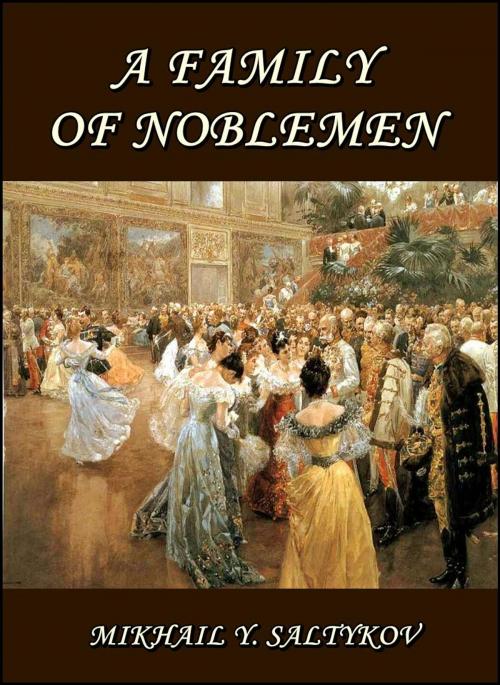| Author: | Mikhaïl Saltykov | ISBN: | 1230000218552 |
| Publisher: | BONI & LIVERIGHT, INC. | Publication: | February 14, 2014 |
| Imprint: | Language: | English |
| Author: | Mikhaïl Saltykov |
| ISBN: | 1230000218552 |
| Publisher: | BONI & LIVERIGHT, INC. |
| Publication: | February 14, 2014 |
| Imprint: | |
| Language: | English |
A Family of Noblemen : The Gentlemen Golovliov
The head of the family, Vladimir Mikhailych Golovliov, was known from his youth as a dissolute, quarrelsome fellow, with nothing in his character that would be sympathetic to a serious, active woman like Arina Petrovna. He led a lazy, good-for-nothing existence, usually stayed locked up in his room, where he imitated the warble of the starlings, the crowing of cocks, and the like, and composed ribald doggerel. In bursts of confidence he would boast that he had been a friend of the poet Barkov, intimating that the poet had blessed him on his deathbed. Arina Petrovna disliked her husband's verses from the very first. "Nasty stuff!" "Trash!" she called them. And since Vladimir Mikhailych's very object in marrying had been to have someone ever at hand to listen to his poetry, the result was that quarrels soon began, which grew worse and worse and more frequent until they ended with Arina Petrovna utterly indifferent and contemptuous of her clown husband, and Vladimir Mikhailych hating his wife sincerely, with a hatred considerably mixed with fear. The husband called the wife a "hag" and a "devil"; the wife called the husband a "windmill" and a "balalaika without strings."
They lived together in this way for more than forty years, and it never occurred to either of them that there was anything unnatural in such a life. Time did not diminish Vladimir Mikhailych's quarrelsomeness; on the contrary, it took on a still sharper edge. Apart from the poetical exercising in Barkov's spirit that he did, he began to drink and to lie in wait eagerly for the servant girls in the corridors. At first Arina Petrovna looked on this new occupation of her husband's with repugnance. She even got wrought up over it, not so much from jealousy as that she felt it to be an interference with her authority. After a while, however, she shrugged her shoulders, and merely watched out that the "dirty wenches" should not fetch brandy for their master.
A Family of Noblemen : The Gentlemen Golovliov
The head of the family, Vladimir Mikhailych Golovliov, was known from his youth as a dissolute, quarrelsome fellow, with nothing in his character that would be sympathetic to a serious, active woman like Arina Petrovna. He led a lazy, good-for-nothing existence, usually stayed locked up in his room, where he imitated the warble of the starlings, the crowing of cocks, and the like, and composed ribald doggerel. In bursts of confidence he would boast that he had been a friend of the poet Barkov, intimating that the poet had blessed him on his deathbed. Arina Petrovna disliked her husband's verses from the very first. "Nasty stuff!" "Trash!" she called them. And since Vladimir Mikhailych's very object in marrying had been to have someone ever at hand to listen to his poetry, the result was that quarrels soon began, which grew worse and worse and more frequent until they ended with Arina Petrovna utterly indifferent and contemptuous of her clown husband, and Vladimir Mikhailych hating his wife sincerely, with a hatred considerably mixed with fear. The husband called the wife a "hag" and a "devil"; the wife called the husband a "windmill" and a "balalaika without strings."
They lived together in this way for more than forty years, and it never occurred to either of them that there was anything unnatural in such a life. Time did not diminish Vladimir Mikhailych's quarrelsomeness; on the contrary, it took on a still sharper edge. Apart from the poetical exercising in Barkov's spirit that he did, he began to drink and to lie in wait eagerly for the servant girls in the corridors. At first Arina Petrovna looked on this new occupation of her husband's with repugnance. She even got wrought up over it, not so much from jealousy as that she felt it to be an interference with her authority. After a while, however, she shrugged her shoulders, and merely watched out that the "dirty wenches" should not fetch brandy for their master.















